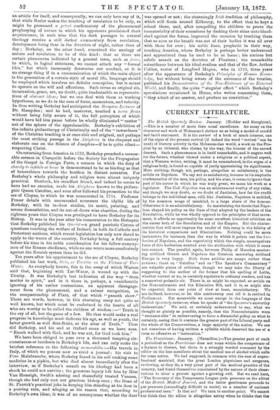CURRENT LITERATURE.
The British Quarterly Review. January. (Hodder and Stoughton). —This is a number of more than usual excellence. An essay on the character and work of Mohammed strikes us as being a model of candid and lucid statement. It is the review of a book of much interest, one of the signs of the present revival (if indeed the word "revival "can be used) of literary activity in the Mohammedan world, a work on the Pro- phet by an Oriental, who claims, by the way, the honour of the sacred descent. Such a phenomenon is in itself remarkable, and it augurs well for the future, whether viewed under a religions or a political aspect, that a Western writer, writing, it must be remembered, in the organ of a religious body, is found so capable of justly appreeiating its significance. More striking, though not, perhaps, altogether so satisfactory, is the article on Napoleon. We say not so satisfactory, because in its emphatic condemnation of the man, his policy, and his aims, it seems to ignore that part of his career in which he was truly great, we mean his work as a legislator. The Code Napoleon was an achievement worthy of any ruler, and though we may doubt, as we doubt of Justinian, how far the credit belongs to the individual man, still, like Justinian, Napoleon is entitled, by the common usage of mankind, to a large share of the honour. Otherwise it is an admirable:essay. In maintaining the thesis that Napo- leon shaped his policy on the lines of that adopted by the leaders of the Revolution, while he was wholly opposed to the principles of that move- ment, it affords an opportunity for some excellent historical criticism on the career both of the Revolution and of the Empire. But the charac- teristic that will most impress the reader of this essay is the felicity of its historical comparisons and illustrations. Nothing could be more instructive, for instance, than the way in which it points out the bar- barism of Napoleon, and the superiority which the simple, unscrupulous force of this barbarism exerted over the civilization with which it came into contact. The parallel, again, between Philip of Macedon master- ing civilized Greece and Napoleon the Corsican mastering civilized Europe is very happy. Both those articles are essays rather than reviews ; those on " Catullus " and on "The Speaker's Commentary" are valuable pieces of criticism, though we may take the liberty of suggesting to the author of the former that his spelling of Latin, whether correct or no, is certainly repulsive to ordinary readers, and has a somewhat pedantic air. There is, as might be expected, an article on the Nonconformists and the Education Bill, and it is, as might also be expected, from our point of view at least, unsatisfactory. We are inclined, however, to let this controversy rest till it is revived in Parliament. But meanwhile we must except to the language of the British Quarterly reviewer, when he speaks of "the Spectator's unworthy insinuations." We said, or certainly endeavoured to say, what we thought as plainly as possible, namely, that the Nonconformists were " unreason able " in endeavouring to force a distasteful policy on what is certainly, seeing that it contains the greater part of the Liberal party and the whole of the Conservatives, a large majority of the nation. We are not conscious of having written a syllable which deserved the use of a term so offensive as "insinuation."


































 Previous page
Previous page